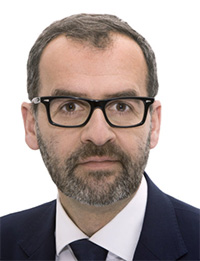 |
Prof. Piotr Stepnowski - since the beginning of his academic career, Prof. Piotr Stepnowski has been affiliated with the University of Gdańsk, Poland, where he has headed the Department of Environmental Analysis since 2006. lecture on Tuesday entitled: "Analytical challenges in fate assessment of pharmaceuticals in the environment" His scientific interests include research on mechanisms of distribution and chemical transformations of environmental pollutants and methods of their analysis, as well as toxicological assessment of the effects of their occurrence. He has published over 200 original and review scientific papers. He is the editor of 8 scientific monographs and 3 academic textbooks as well as 15 chapters in prestigious international publishing houses. He gave over 50 lectures. His works have been quoted over 5000 times and the current Hirsch index is 44. He completed long-term scientific internships at the University of Lund, the Marine Research Centre in La Spezia and the University of Bremen. He was also a participant of a polar scientific expedition of the Institute of Oceanology PAS on board r/v "Oceania". He has promoted 14 doctors. He was the initiator and first director of the Institute of Environmental Protection and Human Health of the University of Gdańsk. In 2012-2016, he was the Dean of the Faculty of Chemistry of the University of Gdańsk. Since 2016, he has been the Vice-Rector for Science at the University of Gdańsk. His most important non-scientific interests include fine arts, architecture and music, including active wood sculpture and guitar playing, as well as his constant fascination with Italian Renaissance painting and architecture. |
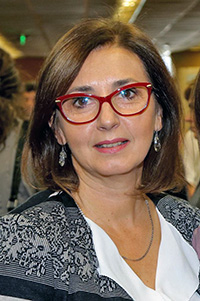 |
Prof. Olivera Đuragić - a former General Manager at the Institute of Food Technology (2015-2019) and senior research associate with a Ph.D. in Food Engineering at the Faculty of Technology, the University of Novi Sad in Serbia lecture on Tuesday entitled: "Plant-based by-products: environmental hazard or valuable feed ingredient?" Dr. Djuragic has over 26 years of experience in scientific work on fields such as feed quality and safety, technology of animal feed production, the processing of raw materials and finished compound feeds, the working accuracy of process (homogeneity of compound feeds, cross-contamination and carry over), the utilization of agricultural and food by-products as well as on the implementation of feed safety quality system in feed mills (HACCP) and the development and implementation of trainings in formal and informal education and related training materials and publications. The vast experience in this area of expertise comes not only from the years spent as a researcher in the Feed Technology Department but also from the active participation in international projects such as FEED TO FOOD, FOODSEG, INNO-FOOD-SEE, AP4INNO, DANUINTEG. She is a member of several international associations and networks (Food cluster initiative, Bacfoodnet, Foodsegnet) and USDA Cochran fellowship grantee in the “Food Safety” program in 2014. She published more than 180 scientific and technical papers and participated in a great number of international conferences. |
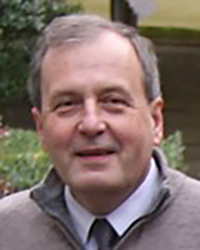 |
Prof. Wojciech Wolf is a Head Environmental and Coordination Chemistry Group at the Institute of General and Ecological Chemistry, Łódź University of Technology, Poland lecture on Tuesday entitled: "Environmental and chemical aspects of plant stress induced by heavy metals" His major research interests originated from the crystal structure analysis. Recently, he is also involved in environmental chemical analysis aimed at heavy metal pollution and protection of soil and water. Special emphasis is directed toward the additive interactions of plant stress factors and the way their affect plant photosynthesis. Professor Wolf is also involved in applied projects directed towards reduction of waste load in sewage from power stations and development of electrodes for the molten carbonate fuel cells. He has published over 80 original research papers and is co-author of five patents. His works have been citied 750 times, the H factor is 16. He completed long-term internships at Oxford University, the Free University of Berlin and the SERC Synchrotron Research Laboratory at Daresbury (UK). He was a deputy dean (2005-2008) of the Chemical Faculty and a vice-rector (2008-2012) of the Łódź University of Technology. In 2009-2018 he was elected a vice president of the European University Foundation. Since 2014 he is an honorary consul of Grand Dutchy of Luxembourg in Łódź and a vice president of the Łódź Scientific Society. |
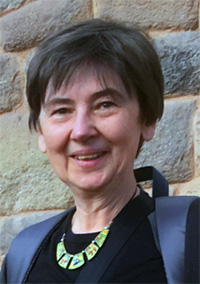 |
Prof. Ewa Bulska - is working at the Faculty of Chemistry, University of Warsaw, Poland. Since 2005, Head of the Metrology in Chemistry Centre at the University of Warsaw. Since 2013, Director of Biological and Chemical Research Centre at the University of Warsaw, Poland lecture on Wednesday entitled: "Towards food safety via bio-stimulated increasing nutritional value of selected plants" Member of Committee of Analytical Chemistry of Polish Academy of Sciences (KChA PAN) and the Chair of the Analytical Spectrometry Working Group of KChA PAN; member of Polish Chemical Society; member of Board of POLLAB; member of Executive Committee of EUROLAB. She is an author or co-author of over 190 scientific publications, few book chapters and several review papers in the field of analytical chemistry: inorganic and bioinorganic trace analysis; environmental, clinical and food samples; archeometry; atomic spectrometry (AAS, OES, MS); atom formation process in graphite furnace and in plasmas; mechanism of matrix interferences; hydride generation with AAS, ICP and MIP OES; investigation of speciation with GC MIP-OES, HPLC ICP-MS or solid sorbents; flow and flow injection system for AAS, OES and MS; use of EPMA, SIMS, XANES and LA ICP-MS for the investigation of surface and sub-surface domain of various solids (graphite, archeological samples, foods); isotopic dilution in ICP-MS; chemical isotope effects of Ga, In and Ge; metrology in chemistry. She contribute to the book “Inorganic Trace Analytics Trace Element Analysis and Speciation”, ed. H.Matusiewicz and E. Bulska (De Gruyter, 2018), She is an author of monography “Metrology in Chemistry” (Springer, 2018). Her achievement was recognised with a number of awards, in between with the prestige Bunsen-Kirchhoff Award, given by German Chemical Society (2004), Wiktor Kemula Award, given by Polish Chemical Society (2012), IUPAC’2015 Distinguished Women in Chemistry Award given by IUPAC (2015) and Jerzy Fijałkowski Award, given by Analytical Spectrometry Working Group of KChA PAN (2016). |
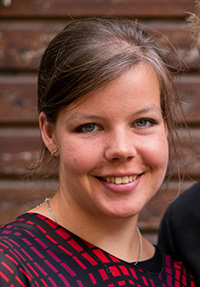 |
Dr. Barbara Kubíčková - RECETOX, Masaryk University, Brno, Czech Republic lecture on Wednesday entitled: "Natural Toxins in the Freshwater Environment – Occurrence, Fate and Health Implications" Work experience: |
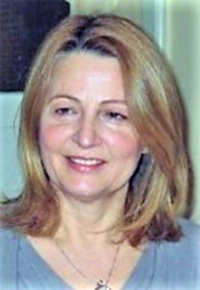 |
Prof. Ljiljana Mojović - Professor of „Biochemical Engineering”, University of Belgrade, Faculty of Technology and Metallurgy, Department of Biochemical Engineering and Biotechnology, Belgrade, Serbia lecture on Thursday entitled: "Bioprocessing agro-industrial residues into value added products" Dr Ljiljana V. Mojović, is Full Professor at The University of Belgrade, Serbia. Her basic education is technical and biochemical - in the field of biochemical engineering and biotechnology. Her main research interests are various biotechnological processes and microbial fermentations employed in environmental protection, waste water treatment, utilization of renewable biomass for food, feed and biofuel production. She participated in a number of research and industrial projects, and authored or co-authored 7 books and 105 international scientific articles (h index=22, citation=1411 according to Scopus on 11.11.2019) |
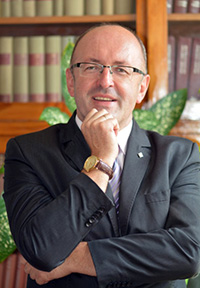 |
Prof. Janusz Igras PhD. Eng. is the General Director of the Łukasiewicz Research Network - New Chemical Syntheses Institute in Puławy, Poland lecture on Thursday entitled: "Smart fertilizers - reality or researcher's fantasy?" Prof. Igras from 1990 to 2011 worked in the Institute of Soil Science and Plant Cultivation – State Research Institute in Puławy. For many years he was a member of the Central Council of Science and Higher Education and the president of the Scientific Board of Puławy Competence Center at Grupa Azoty Puławy. Currently, he is a member of the Scientific Council at Jerzy Haber Institute of Catalysis and Surface Chemistry Polish Academy of Sciences. Prof. Janusz Igras is a recognized expert in the field of fertilizers an fertilization and his research is also focused on chemistry and agriculture. |
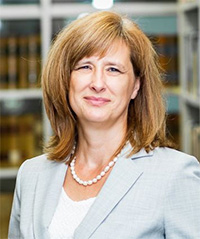 |
Prof. Beata Godlewska-Żyłkiewicz is the head of the Chair of Analytical and Inorganic Chemistry at the Faculty of Chemistry, University of Bialystok (UwB), and the vice chairmen of the Committee of Analytical Chemistry of Polish Academy of Sciences. lecture on Thursday entitled: "Nanomaterials - environmental risks and speciation analysis of metal nanoparticles in environmental samples" In the past, prof. Beata Godlewska-Żyłkiewicz was the vice Rector for Research and International Relations, and the Dean of the Faculty of Biology and Chemistry of the University of Bialystok. Her scientific interest is mainly focused on developing methods for analysis of technologically critical elements (TCE), including platinum group elements as well as speciation analysis of metals, metalloids, and nanoparticles in environmental samples. Her research brings a holistic approach to different dimensions of metals analysis, e.g. problems of stability of metallic forms, novel separation methods, elimination of interferences, and quality assurance of analytical results. Moreover, she performs studies on the impact of NPs on the environment, and an bioavailability of metals from soils and waters by plants and microorganisms. She is a co-author of 120 scientific papers, almost 80 among these were published in internationally recognized journals. |
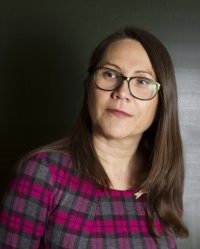 |
Dr. Beata Krasnodębska-Ostręga is a leader of Research Group - Analytical chemistry in investigation and protection of the environment at Faculty of Chemistry, University of Warsaw, Warszawa, Poland lecture on Thursday entitled: "Sampling and sample pretreatment as a critical point of environmental analysis of water - total and species analysis" Dr. Beata Krasnodębska-Ostręga – her scientific interests are: environmental analysis; environmental monitoring (biomonitoring and sample banking); determination of traces of “heavy” metals (Pt, Pd, Tl, Zn, Cd, Cu, Ct, Pb) and metalloids (As) in environmental samples (water, soil, sediments, food, plant and animal tissues); phytoremediation processes; waste management; chemical/physical speciation and fractionation; preparation of new control materials; development of sampling procedures of water and solid samples; optimization of sample pretreatment step (sampling, milling, homogenization), digestion/mineralization (microwave assisted) and UV/Vis digestion (chemically or catalytically accelerated), application of solid phase extraction and liquid chromatography in trace speciation analysis; application of ICP MS and voltammetric determination in total content and speciation analysis/fractionation (water, soil, sediment). Currently she is: Vice-Dean for Student Affairs (FCh UW) and Vice-chairman of the University Council of the Center for Environmental Studies and Sustainable Development of UW, and Member of the Spectral Analysis Team of the Analytical Chemistry Committee of the Polish Academy of Science. |
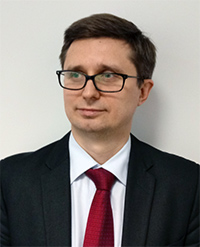 |
Dr. Marcin Konkol is currently a Scientific Director of the New Chemical Syntheses Institute in Puławy, which has changed its name into the Łukasiewicz Research Network, Poland lecture on Thursday entitled: "Supercritical CO2 extraction - green waste-free technology" In 2005, he completed his PhD thesis in Chemical Sciences at the Martin Luther University in Halle-Wittenberg (Germany), and in 2017 he received a postdoctoral degree in the Technical Sciences at the West Pomeranian University of Technology in Szczecin. In the years 2006–2008 and 2008–2010 he worked at the Aachen University of Technology (RWTH Aachen) and the Sumitomo Petrochemicals Research Laboratory (Sodegaura, Japan), respectively. Since 2010, he has been employed in Łukasiewicz Research Network and in the years 2014–2018 he was also the Scientific Secretary of this Institute. Main interests include catalytic processes, extraction of plant material with supercritical CO2 and chemical analysis. |
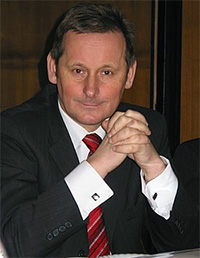 |
Assoc. Prof. Rajmund Michalski works at the Institute of Environmental Engineering, Polish Academy of Sciences in Zabrze, Poland lecture on Thursday entitled: "Applications of ion chromatography for the determination of carboxylic acids in biomass combustion products" Rajmund Michalski works in the Institute of Environmental Engineering, Polish Academy of Sciences in Zabrze (Poland) since 1988. His research concern mainly environmental and analytical chemistry, in particular: ion chromatography (sample preparation, columns, eluents, detectors, and applications) and utilization of hyphenated techniques (IC-ICP-MS, IC-MS) in species analysis (inorganic disinfection by-products, metal/metalloids ions). He is an author of dozen of books, manuscripts and over 270 publications on ion chromatography in environmental and food analysis published in international and popular-science journals. Several times he was on foreign scholarships, including 1 year in Japan (Tohoku University, 2000-2001) and few months in Germany (Institute of Environmental Protection and Geology in Wiesbaden, 1999. 2002, 2010), as well as Universities in Cluj Napoca (Romania) and Bilbao (Spain). He is a member of Polish Association of Chemistry; Polish Academy of Sciences (Committee of Analytical Chemistry); Polish Committee of Standardization and Chairman of Scientific Committee of annual international conference “Ion Chromatography and Related Techniques”. Since 2007 he is a representative of Polish Academy of Sciences in European Academies Science Advisory Council, Environmental Steering Panel (EASAC ESP), and since 2011 a member of National Committee for Cooperation with Advising Scientific Council of European Academies. |